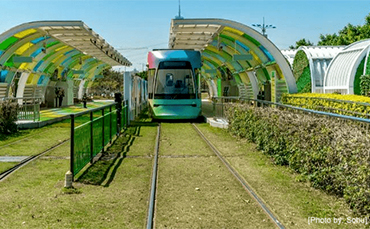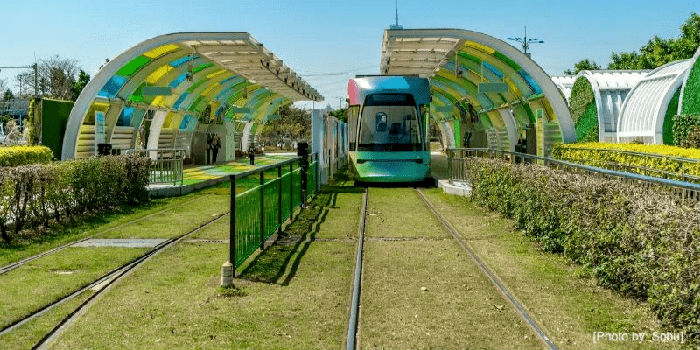



Recently, the Ministry of Transport released the "Green Transport Standard System (2022)" (Transport Science and Technology [2022] No. 36), and the relevant contents are explained as follows.
1.Drafting Background
The development of green and low-carbon transportation is an important initiative for the transport industry to strengthen the development of ecological civilization, serve the national goal of carbon peaking and carbon neutrality, and fight the battle of pollution prevention and control. in 2016, the Ministry of Transport released the Green Transport Standard System (2016), systematically promoted the formulation and revision of 80 green transport standards, and significantly enhanced the supply of standards.
Accelerating the construction of a country strong in transport development has put forward higher requirements for green and low-carbon transport development. In order to implement Xi Jinping's thought on ecological civilization and the Opinions of the Communist Party of China (CPC) Central Committee and State Council on the Complete and accurate implementation of the new concept of development and the work of carbon neutral work, the Opinions of the CPC Central Committee and State Council on the in-depth battle against pollution, the Outline of the Development of Strength in Country's Transport, the Outline of the national comprehensive three-dimensional transportation network planning, the Outline of national standardization development and other documents on green development, systemically plan the task on drafting green transport standard under the new situation, the Ministry of Transport has organized relevant units, on the basis of the analysis of in depth the development trend of green standards in the international and domestic markets, and the comparison with the requirements of the national carbon peak and carbon neutrality and the battle of pollution prevention, as well as the key tasks in relation to the development of green transport of the "14th Five-Year Plan" of the Ministry of Transport, the Ministry of Transport has prepared the Green Transportation Standard System (2022) after multiple researches and discussions.
2.Drafting Principles
Adhere to goal orientation. Comprehensively connect with the objectives and tasks of promoting green development in the transport industry, optimize and improve the green transport standard system to accelerate the development of strength in the country's transportation system, and give full play to the basic support role of standards.
Adhere to coordination and integration. Fully embody the concept of harmonious coexistence between human beings and nature, strengthen the coordination and complementarity between standards, promote transport carbon reduction, pollution reduction, green application expansion and sustainable development, and enhance the level of green governance capacity of transport.
Adhere to highlighting the key points. Concentrate on key areas and key links, accelerate the supply of key standards to serve the goal of carbon peak and carbon neutrality, and further fight against pollution, so as to achieve a breakthrough starting from single points.
Adhere to the lead by innovations. Accelerate the process of transforming scientific and technological innovations into standards, promote the effective supply of standards for new technologies, equipment, materials and processes for energy conservation and environmental protection, and maintain a proper advancement in the construction of the standards system.
3.Scope and Main Contents of the System
The scope of the Green Transport Standards System (2022) is consistent with the 2016 version and mainly includes technical standards and engineering construction standards directly related to the development of green transport in the fields of integrated transport, highways and waterways. The comprehensive transport and urban passenger transport service standards involved in optimizing the transport structure and promoting green transport travel are, in principle, not included in the standard system.
The standard system consists of five parts, namely 100 - basic general standards, 200 - energy saving and carbon reduction standards, 300 - pollution prevention and control standards, 400 - ecological environmental protection and restoration standards, and 500 - resource conservation and intensive use standards. Among them, the basic general standards include two aspects - terminology and green low-carbon evaluation; energy conservation and carbon reduction standards include five aspects - new energy and clean energy applications, energy consumption and energy efficiency, carbon emission control, energy-saving design and management, and accounting and monitoring; pollution prevention and control standards include five aspects - air pollution prevention and control, water pollution prevention and control, noise pollution prevention and control, solid waste disposal and comprehensive discharge of pollutants from ships; ecological Environmental protection and restoration standards include four aspects - environmental protection technology, ecological restoration, prevention of invasive alien organisms and environmental protection and restoration statistics and evaluation; resource conservation and intensive use standards include two aspects - sewage recycling and recycling of waste materials.
The standard system includes 242 national and industry standards for green transport, including 11 basic general standards, 101 standards for energy saving and carbon reduction, 78 standards for pollution prevention and control, 35 standards for ecological environmental protection and restoration, and 17 standards for conservation and intensive use of resources. Among them, 47 standards are to be developed and 44 standards are to be revised, including key standards in need for development such as industry carbon emission accounting and verification, nearly zero carbon transportation demonstration zone development, urban green freight distribution assessment, hydrogen fuel cell bus configuration, urban rail transit green operation, and underwater salvage operation anti-pollution technology. In addition, the standard system also lists 43 national standards and eco-environmental industry standards that are closely related to energy saving and carbon reduction, pollutant emissions and eco-environmental protection in the transport industry, in order to promote the coordinated implementation of green standards.
The revision and implementation of the green transport standards system will further fill in the shortcomings, strengthen the weaknesses and promote enhancement in energy saving and carbon reduction, pollution prevention and treatment, ecological environmental protection and restoration, resource conservation and intensive use of standards in the transport sector, accelerate the formation of green and low-carbon transport modes, promote the harmonious development of transport and nature, and provide strong support for accelerating the development of a country strong in transport systems.
Source: <https://mp.weixin.qq.com/s/P2pExMqsS8NGDc3Ss2Dt5A>
Image Source: <https://www.sohu.com/a/578800481_121106902>
Translated by: Junyi Fan